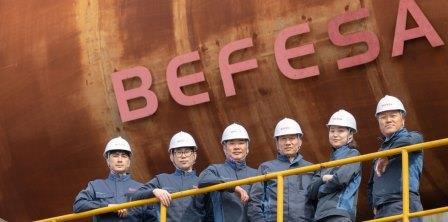

The leading provider of hazardous waste recycling services, Befesa S A which enables the circular economy within the steel and aluminium industries, has released its ESG Report for 2021.

Befesa has published its ESG Report following its publication of the 2021 Annual Report in March, which delivers an insight into the developments attained in ESG during 2021 and also an update on the main ESG performance indicators.
Now this year, Befesa devotes a distinctive chapter to Climate Change, where it is detailed how Befesa is positioned regarding this important challenge. Befesa is fully committed to making strong contributions toward creating a more sustainable society as part of the circular economy.
Befesa has been very successful in achieving its ambition to improve its recycling capacity and the volume of materials recovered through a circular economy.
Presently, Befesa limits landfills of hazardous materials by recycling more than 2 million tonnes of hazardous waste per annum. In doing so, Befesa contributes to the preservation of biodiversity and prevents heavy metals from leaking into soils and waterways and causing pollution and environmental degradation.
The primary contribution of Befesa to the world from the ESG point of view is its potential to recycle waste from EAF steel and secondary aluminium producers into zinc and aluminium, reducing the cost of production by applying secondary materials and diminishing the environmental impact of metals production by reducing the amount of mining that is necessary. However, from the climate change point of view, Befesa also has a positive impact on the environment.
By recycling, Befesa produces secondary materials that are a more environmentally friendly alternative to mining and processing virgin raw materials. In order to evaluate the climate impact of its operations, Befesa employed a lifecycle analysis approach. As a result of that analysis, Befesa's operations avoid around 2.4 million tonnes of CO2 equivalent each year.
Additionally, Befesa's operations support closing the loop within the steel and aluminium industries helping a truly circular value chain. It contributes to the decarbonisation of the steel and aluminium industries by enabling the transition to EAF steel and secondary aluminium production, which are much less CO2 intensive than primary production.
The market leader of recycling plants, Befesa has committed to 20 per cent GHG emission intensity reduction by 2030, supported by a roadmap to attain the target, largely via green energy sourcing, electricity efficiency, process optimisation and raw material substitution. Furthermore, it is targeting net-zero emission by 2050 provided that precise technologies currently under development become technically viable and economically feasible by investing now into new technologies, partnering with relevant stakeholders, and reinforcing the sustainability ecosystem (biocoke, Hydrogen, Carbon Capture, etc.)
Responses








